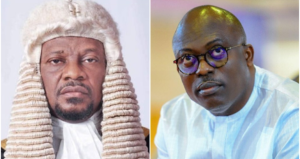Legal drama, power struggles, and economic stakes—Breaking down key insights from AGF Fagbemi’s interview.
In a move shaking Nigeria’s political foundations, President Bola Tinubu recently declared a state of emergency in Rivers State, suspending Governor Siminalayi Fubara, his deputy, and the entire House of Assembly. Attorney General Lateef Fagbemi defends the move as necessary to restore constitutional order, citing Supreme Court judgments, security threats, and economic sabotage.
But beyond the immediate crisis, this declaration carries profound implications for Nigerian democracy. Here’s what you need to know.
A. Legal Justifications: Was the Emergency Constitutional?
 The Constitutional Backdrop:
The Constitutional Backdrop:
Nigeria’s 1999 Constitution (Section 305) allows the President to proclaim a state of emergency during extreme situations—war, unrest, or clear danger to public order—subject to National Assembly approval.
Supreme Court Judgment:
On February 28, 2025, Nigeria’s Supreme Court ruled decisively against Governor Fubara, accusing him of demolishing the State House of Assembly and creating a lawless state. The court’s verdict stated explicitly: Rivers State had effectively ceased having a legitimate government.
Debate Over Federal Powers:
Critics question whether Section 305 allows the suspension of elected governors and legislatures. AGF Fagbemi argues that Rivers State’s unique circumstances justified the drastic action, positioning the emergency declaration as a constitutional necessity rather than federal overreach.
B. Political Power Play: Who Gains, Who Loses?

Federal vs State Dynamics:
President Tinubu’s emergency proclamation increases federal authority, especially in an opposition-led state traditionally dominated by the PDP. It reflects Abuja asserting dominance, potentially reshaping the balance of federal-state power.
Governor Fubara’s Paradoxical ‘Rescue’:
Ironically, the federal intervention might have saved Governor Fubara from an ongoing impeachment proceeding. While temporarily suspended, Fubara avoided complete removal from office—a move AGF Fagbemi acknowledged as potentially beneficial to the embattled governor.
The Wike Factor:
Minister Nyesom Wike’s political battles with Governor Fubara have influenced perceptions. Although AGF Fagbemi insists Wike wasn’t behind the emergency declaration, it politically benefits Wike by curbing Fubara’s power, reaffirming his influence within Rivers State politics.
C. Security Stakes: Militants and Oil Pipelines
Militancy Threat:
Pipeline explosions in Rivers State threatened national economic stability. AGF Fagbemi accused Governor Fubara of failing to condemn militant threats and indirectly signaling encouragement—a charge underpinning the federal government’s emergency justification.
National Security Concerns:
With Nigeria’s oil exports heavily reliant on stability in Rivers, vandalism of oil infrastructure directly threatens national economic security. Federal intervention seeks to prevent a recurrence of widespread economic sabotage reminiscent of previous Niger Delta crises.
D. Economic Risks and Realities
Oil Production at Risk:
Rivers is central to Nigeria’s oil economy, accounting for significant revenues. Any sustained disruption risks severe financial losses, affecting national budgets, state allocations, and international investor confidence.
Short-term Pain, Long-term Stability?
While emergency rule creates immediate uncertainty, federal intervention intends to restore order and protect critical infrastructure, potentially stabilizing Nigeria’s economic outlook if successful.
E. Democratic Consequences: Precedent or Warning?
Democratic Integrity at Stake:
Suspending democratically elected officials challenges the fundamental principle of electoral accountability. Historically cautious about invoking emergency powers, Tinubu’s drastic measure has sparked concern regarding possible erosion of democratic norms.
Historical Context and Future Impact:
Comparisons to past emergencies (Plateau in 2004, Ekiti in 2006, and Boko Haram states in 2013) highlight variations in emergency declarations. Tinubu’s decisive action marks a significant shift, setting a possible precedent for future federal interventions in state crises.
National Assembly’s Crucial Role:
The upcoming National Assembly vote to ratify or reject the emergency is vital. Their decision will either validate the President’s unprecedented move or reinforce democratic safeguards against federal overreach.
What Comes Next?
This unfolding drama could dramatically alter Nigeria’s democratic practices. Key questions remain:
- Will the National Assembly back President Tinubu’s decision?
- Can Rivers State return swiftly to democratic normalcy?
- What lasting precedent will this emergency declaration set?
The answers could define Nigeria’s political landscape for years.
Stay connected with IDNN for ongoing updates and deep analysis on this developing story.
